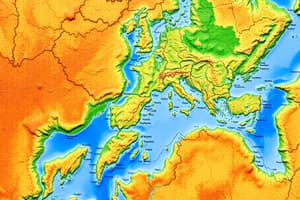Podcast
Questions and Answers
What are the main focus areas of Human Geography?
What are the main focus areas of Human Geography?
- Ocean currents and weather phenomena
- Physical landscapes and climate patterns
- Human interactions and cultural practices (correct)
- Natural resources and geological formations
What is the primary difference between absolute and relative location?
What is the primary difference between absolute and relative location?
- Absolute location is more subjective than relative location.
- Absolute location is always fixed, while relative location varies.
- Absolute location uses coordinates, while relative location uses landmarks. (correct)
- Absolute location can change due to geographical shifts.
Which of the following best describes Geographic Perspective-SPEE?
Which of the following best describes Geographic Perspective-SPEE?
- Scale, Proximity, Edge, Engagement analysis
- Spatial, Political, Environmental, Emotional analysis
- Social, Political, Economic, Environmental analysis (correct)
- Sociability, Policy, Ecosystem, Evolution analysis
Which of the following is an example of a Primary Source?
Which of the following is an example of a Primary Source?
Which of the following questions exemplifies a comparative question in geography?
Which of the following questions exemplifies a comparative question in geography?
Flashcards
What is Geography?
What is Geography?
Geography is the study of the Earth's surface, including its physical features and human activities. It encompasses the spatial distribution and relationships of phenomena, exploring how people interact with their environment.
Absolute Location
Absolute Location
Absolute location refers to a precise position on Earth using coordinates, often using latitude and longitude. It's like a fixed address.
Relative Location
Relative Location
Relative location describes a place in relation to other places. It is based on proximity and relationships.
Spatial Significance
Spatial Significance
Signup and view all the flashcards
Geographic Perspective
Geographic Perspective
Signup and view all the flashcards
Study Notes
Geography: Human and Physical
- Human geography explores human societies, cultures, and their interactions with the environment.
- Physical geography examines the Earth's physical features, processes, and systems, including climate, landforms, and ecosystems.
Canada's Global Ranking
- Canada's global ranking (in terms of landmass and population) varies depending on the specific ranking scale, but is generally positioned within the top 10 largest countries by land area.
- Canada's ranking in terms of population size is significantly lower, given its vast area and relatively low population density.
Key Concepts in Geographical Study
- Geographers use the '5 Ws' (Who, What, When, Where, Why) to thoroughly examine issues. This system helps to categorize and understand various interactions, events and factors involved.
- The '5 Ws' are expanded upon using other aspects of geographical study (e.g. how, impact, influence, consequence, connection, etc.).
Absolute vs. Relative Location
- Absolute location describes a precise point on Earth using coordinates (latitude and longitude).
- Relative location describes a place's position in relation to other places.
Definition of Geography
- Geography is the study of the Earth's surface, its features, and processes.
GPS (Global Positioning System)
- GPS is a satellite-based navigation system that provides location information.
GIS (Geographic Information System)
- GIS is a system used to input, store, analyze, and present geographic data.
Spatial Significance
- Spatial significance refers to the importance of "what is where?". This means understanding that the location of something can significantly impact its characteristics and value.
Geographic Perspective (SPEE)
- The geographic perspective (SPEE) examines spatial patterns and processes. This perspective focuses on where things are located, why they are there, and how they interact.
Absolute vs. Relative Location (Recap)
- Absolute location uses coordinates (longitude and latitude);
- Relative location describes a position compared to other places.
Types of Geographical Questions
- Causal: Explores reasons behind occurrences.
- Factual: Aims to determine what happened.
- Comparative: Compares characteristics between locations.
Primary vs. Secondary Sources
- Primary sources are firsthand accounts, evidence or documents from the time.
- Examples of primary sources: Photos, journals, letters, interviews or original research findings.
- Secondary sources are interpretations or analyses of primary sources.
- Examples of secondary sources: Textbooks, magazine articles, essays that evaluate past events.
Interrelationships
- Interrelationships refer to the connections and interactions between various components and elements within a system (e.g., social, economic, environmental).
Studying That Suits You
Use AI to generate personalized quizzes and flashcards to suit your learning preferences.
Description
Explore the crucial aspects of human and physical geography in this quiz. Understand Canada's position in global rankings concerning landmass and population, and familiarize yourself with the key concepts like the '5 Ws' that geographers utilize for their studies. Challenge your knowledge and expand your geographical insights.



